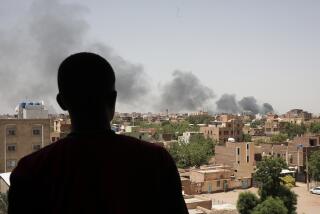U.S. Diplomat Howell Comes Home a Hero : Hostages: He says that ‘we could do nothing else’ but hold out in the besieged Kuwait embassy until all Americans were free.
- Share via
WASHINGTON — Calling them “victorious” and heroic, Secretary of State James A. Baker III welcomed back U.S. diplomats from Kuwait city and the last group of American and Canadian hostages from Kuwait and Iraq on Friday at Andrews Air Force Base.
Ambassador W. Nathaniel Howell III, who along with a skeleton staff had withstood threats and deprivation to keep open the U.S. Embassy in Kuwait, declared that “we could do nothing else” but hold firm in the besieged compound until the last Americans were freed.
“Yesterday morning, I locked the door on the embassy and left the garrison flag flying,” Howell told the crowd of well-wishers at Andrews Air Force Base. “The embassy will reopen in a free Kuwait.”
He called President Bush’s policy in the Persian Gulf “moral and honorable and right.”
“Make no mistake,” Howell said, “the only industry in Kuwait today is war and military occupation.”
“I left Iraqis building bunkers around the seacoast and around our embassy. I saw no indication that they plan to leave,” said the ambassador, 50, who warded off the clear December chill with a tan raincoat.
The 48 passengers cheered and waved as they walked off the C-5 military transport plane onto a red carpet shortly after 4 p.m. and into the warm embraces of about 400 family members.
Roses, green and silver balloons and, in one case, a full-length fur coat greeted the passengers--23 Americans, 10 spouses and children of Americans, and 15 Canadians. After 132 days in detention--either in the embassy or in hiding--the former hostages left Baghdad on Thursday and spent the night in Frankfurt, Germany.
Calling Iraqi President Saddam Hussein a “vicious and capricious dictator” and an international outlaw, Baker told the delegation: “Your ordeal is over, but the ordeal of the Kuwaiti people continues.”
Baker told the former hostages that Hussein “deserves no thanks, no reward” for releasing the foreign nationals, some of whom were detained as “human shields” at military and industrial sites to deter a possible attack from U.S.-led forces against Iraq.
Howell, with a spirited step, was the first to walk off the plane. He stood beside his wife with his hands behind his back as he listened to Baker’s welcoming speech.
Howell kept the embassy open in defiance of an Iraqi order that all foreign embassies in Kuwait close by Aug. 24. He said it was more than just an American effort that allowed about 20 Americans, who fled Iraqi troops during the Aug. 2 invasion, and his embassy staff to survive. He mentioned Europeans and Canadians but did not detail their actions.
The embassy staff, trapped inside the U.S. compound without electricity and tap water for almost four months, reportedly survived on canned tuna and boiled water from the compound’s swimming pool.
Howell said he and his staff were proud to have stayed and overseen more than a dozen flights of American citizens from Iraq and Kuwait. Earlier this week, State Department spokesman Richard Boucher said 2,520 Americans had been evacuated in 13 flights since Aug. 2; 200 more Americans escaped from Iraq and 600 from Kuwait.
No more flights are planned, since all Americans who want to leave have been given the chance and commercial flights have resumed to Amman, Jordan. The State Department estimates that about 500 U.S. citizens remain in Kuwait and Iraq by their own choice. That figure includes 294 children, 100 women and 115 men with dual citizenship.
Howell concluded by addressing Baker and saying: “As you pointed out, our ordeal is over, but the ordeal of the Kuwaitis and the problems created by the war begun in August, which we all would prefer to be solved peacefully, still persist in Kuwait. The people of Kuwait must be free.”
More to Read
Sign up for Essential California
The most important California stories and recommendations in your inbox every morning.
You may occasionally receive promotional content from the Los Angeles Times.













